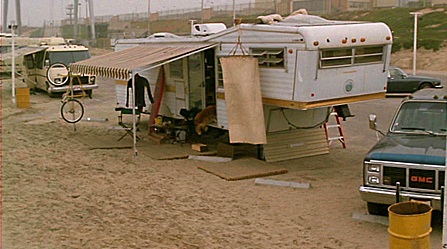Movie trailers
Wednesday, April 11th, 2012 • Movies / Politics / Writing
Not “trailers” as in “Coming Attractions” (or, the three-minute-no-second ads for movies that are a burgeoning art form in themselves) (I made one myself for my favorite movie). I’m talking about actual trailers, or “mobile homes” or “ten-wides” or “single-wides” depending on what sort of construction or zoning nomenclature you’re using.
Would you ever want to live in a trailer? Okay, no, would be the immediate, obvious answer, unless you had to. But a surprising, statistically-disproportionate number of movie characters do exactly that, and they’re not necessarily characters who are down on their luck. Martin Riggs (Mel Gibson) not only cheerfully abides in what appears to be a standard ten-wide (above) in both Lethal Weapon and Lethal Weapon 2 (wherein it’s destroyed by machine gun fire from a helicopter) but genuinely enjoys it (“I like living the way I live!”), even managing to bring ersatz-South-African hottie Patsy Kensit there for the kind of Olympian first-date sex marathon that occurs so often in ‘Eighties movies. Bud (Michael Madsen), Bill’s beloved (and doomed) brother in Tarantino’s operatic Kill Bill saga, occupies a trailer that’s somehow even more majestic and romantic (especially as photographed by Robert Richardson); Uma Thurman and Daryl Hannah engage in the epic’s fiercest battle (which is saying a great deal) within its twelve-foot-wide, flakeboard-paneled, shag-carpeted confines.
Natalie Portman’s also a trailer-dweller in Thor (the thunder-god’s appearance there embarasses her far more than is warranted; after Asgard, all mortal dwellings must look about the same). David Lynch created a spellbinding neo-Lovecraftian surrealist tableau (“LET’S ROCK” painted in soap on a Chrysler windshield) within a twilit trailer park in his underrated Twin Peaks Fire Walk With Me (Harry Dean Stanton was the memorable custodian for whom the murders meant “just more shit I’ve got to do”). I think I remember Sam Shepard bringing the drama within the laminated walls of trailers more than once, and I think Jodie Foster’s Oscar™-winning turn in The Accused had her talking across her trailer’s formica table. Mickey Rourke’s home in The Wrestler is the only recent movie trailer I can think of that’s meant to convey pure pathos and defeat, unleavened by iconoclasm, hope or Robert Ventura-style “tin pan alley” tinsel-romance. I’d be happy to be reminded of other movie trailers I’m forgetting.
The Wikipedia “trailer-park” entry is heavily politicized: obviously the demographic referred to as “trailer trash”—the 6.8 million Americans (2.1% of the population; nearly as many as occupy all five New York City boroughs) who live in “mobile homes”—does not appreciate the appellation and are, like Orwell’s London “proles,” on the correct side of the economic battle lines; they are warriors in our army and no other (unless one counts “God’s army,” which, unfortunately, one must). The life lived within pre-painted aluminum panels atop a cast-concrete frame, suspended over the ghosts of automotive axles, is obviously as rich and deep an American odyssey as any other. I don’t think I’ve ever even seen the inside of a classic trailer home; my insular ignorance needs to be corrected.
ON EDIT: I forgot all the trailer sequences in No Country For Old Men (photographed with burnished Fredrick Remington Chiaroscuro by Roger Deakins). I’m not counting the “industrial” trailer complex where Joe Pesci and Sharon Stone seal their fates in Casino.
ON EDIT II: Of course all movie stars, regardless of the tax bracket their characters occupy, rightly regard their own on-set trailers as the most coveted, jealously-guarded, envied, irreproducible real estate around; the irony was not lost on me when I made this post. You’ve got to be an internationally-famous multimillionaire to bed down in one of those ten-wides.
